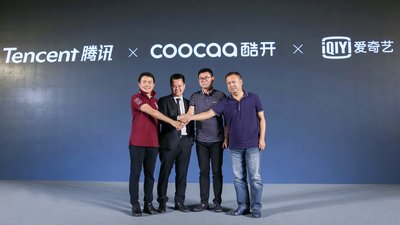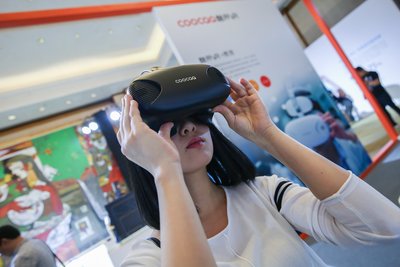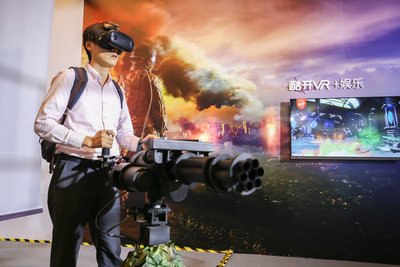TMCnet News
Understanding the capital-driven tie-up between COOCAA and TencentThe content battle in the color TV 3.0 era BEIJING, June 15, 2017 /PRNewswire/ -- On June 6, 2017, COOCAA, a subsidiary of Chinese TV manufacturer Skyworth Group, announced that the company had received a 300 million yuan investment from Tencent, giving the internet giant a 7.7142 percent stake in COOCAA. This took place less than a year after the introduction of iQIYI as its strategic shareholder.  COOCAA is an internet TV brand as well as the operating system that drives Skyworth Group's tens of millions of TVs sold every year, as well as the hundreds of millions of TVs, internet TV boxes and smart home appliances that the firm has produced. Skyworth and Tencent have already been working together for a while Prior to Tencent's investment in COOCAA, Skyworth had already been cooperating closely with Tencent. From the Penguin Aurora Box jointly launched by Skyworth Digital and Tencent in mid-May to the Skyworth GEEK TV series, the Skyworth Digital VR project and the Skyworth TV "free content along supplied with your hardware purchases" promotions, Skyworth and Tencent have a history of working together. The 300 million yuan deal between COOCAA and Tencent was not accomplished in one stroke but was the result of a long-term "trial marriage" spanning several projects, giving the two companies time to build and reach a consensus on how they would work together in selling VRs and TV boxes as well as in distributing content for TV. The capital-driven cooperation between Skyworth, one of China's largest TV manufacturers, and Tencent, one of China's largest internet companies, was certainly not going to be limited to simply targeting the color TV market. Content and cooperation: a new landscape in the 3.0 era Given the difficulty facing brick-and-mortar stores and their sluggish sales figures, 2017 has become a watershed year in the development not only of China's color TV sector but for the whole smart home appliance industry. The first phase of the roll out of the internet TV in 2013, characterized by low pricing with a focus on hardware, represents the 1.0 era during which the traditional color TV and the emerging internet color TV industries started to merge. The capital, content and strategic cooperation between Skyworth, Tencent and iQIYI is proving to be the new content cooperation and competition model for the 3.0 era. Cooperation and content will become a key value point in the TV 3.0 era. Internet TV manufacturers that relied onhardware to sell TVs at low prices are feeling the pain, as there is no further that they can go in the so-called "large ecology" closed loop. The Skyworth-Tencent-iQIYI tie-up shows once again that it is unrealistic and nigh impossible to change the entire industry within a few years without strong backing and years of cooperation and trials. Do some experimenting, so that you can see how the landscape takes shape. This is the biggest difference between the Skyworth-Tencent-iQIYI tie-up and others like it. A CEO can present the company strategy in a PowerPoint deck and give hundreds of presentations. However, the practical results that the PowerPoint deck portends cannot be achieved if that is all one does, but only through what is termed "Player" (the partners in a project), "Practice" (the repeated trials and experimentation) and "Time" (the time it takes to achieve), each of which is indispensable. It is difficult to create a good product, yet good content is in high demand At a content strategy conference co-hosted by Skyworth and Tencent, Liu Tangzhi, Executive Director/CEO at Skyworth Digital Holdings and President of Skyworth Group, said it is easy to create a PowerPoint, but difficult to create a good product. Consumers usually tend to be driven by the perceived value when shopping, but, at the end of the day, most shoppers are quite rational when it comes to the final buying decision. For most buyers, a good product means a professional brand (not some copycat or no-name brand) + high-end technology (no compromise with performance) + stringent quality management (not handed off to an OEM) + a powerful configuration (no cutting corners or "making do") + quality content (no hype) + after-services (no outsourcing). Today, the competition in terms of content among Internet TV operators has entered the 3.0 era, with good content, especially differentiated content, in high demand. In addition to Skyworth and Tencent working together, other players are sparing no effort in competing when it comes to quality content. What kind of content is good, quality content? Each consumer of content is likely to give a different answer. Content can be categorized quite granularly, but it can generally be segmented into several broad categories: TV and films, entertainment, sports and games. That means content is just the beginning of the cooperation between Skyworth, Tencent and iQIYI. In the TV 3.0 era that will be dominated by differentiation, the capital injection by Tencent portends new upgrades in Skyworth's TV content system, and content innovation would directly lead to new rules for how users interact with the content. The strategic impact of Tencent's 300 million yuan of capital injection into COOCAA sets the wheels in motion that will lead to Skyworth's transformation from a TV set and home appliance manufacturer to a serious player in the pan-entertainment industry. Is the pan-entertainment industry the new direction for Skyworth? The pan-entertainment industry has become an important part and driving force of China's new economy, with total core value reaching approximately 415.5 billion yuan (approx. US$61.1 billion) in 2016. The figure is expected to rise to more than 480 billion yuan (approx. US$70.6 billion) in 2017, with expected annual growth exceeding 15 per cent. The pan-entertainment concept was first proposed in 2011 by Tencent, which then launched its pan-entertainment strategy in 2012. Based on the strategy, the company gradually set up a new interactive entertainment ecosystem that spans the entire spectrum of entertainment, including games, books, animated features, films, television series and telenovelas, with the first step in the execution of the strategy being the creation or acquisition an innovative piece of intellectual property (the IP), then, from that, the creation of derivative works. As the target audiences are similar or even complementary to each other, the boundaries between segments have begun to fade while a core IP becomes the upstream industry's core link. Initially, entertainment forms that are suitable for all cultures and all types of audiences are developed independently, then can gradually be transitioned into other and derivative products, all of which are linked by the common IP. All of these products constitute an integrated whole, creating a mutually beneficial ecosystem, the profit from which can be shared among all the players involved. The essence of the pan-entertainment industry lies in the iterative development of content in a multiplicity of product forms. This can mitigate early risks, reduce marginal costs, expand the audience and increase the rate of return on investment, increasing the product's long tail value and taking advantage of scale. The multiple entertainment forms become the core element of the pan-entertainment market by connecting products through the commonality of the content, having audiences develop an association with the products, and then watching it all resonate across the market. Skyworth COOCAA's tie-up with Tencent and earlier with iQIYI are all moves to gain entry across the entire spectrum of what constitutes the entertainment industry through the iterative development of content. This tie-up is not only of great significance to Skyworth but also a thrilling adventure as it puts the company on the road to innovation while participating in the buildout of a new industrial ecosystem. 
 Photo - https://photos.prnasia.com/prnh/20170613/1874722-1-a SOURCE Skyworth Group 
|
